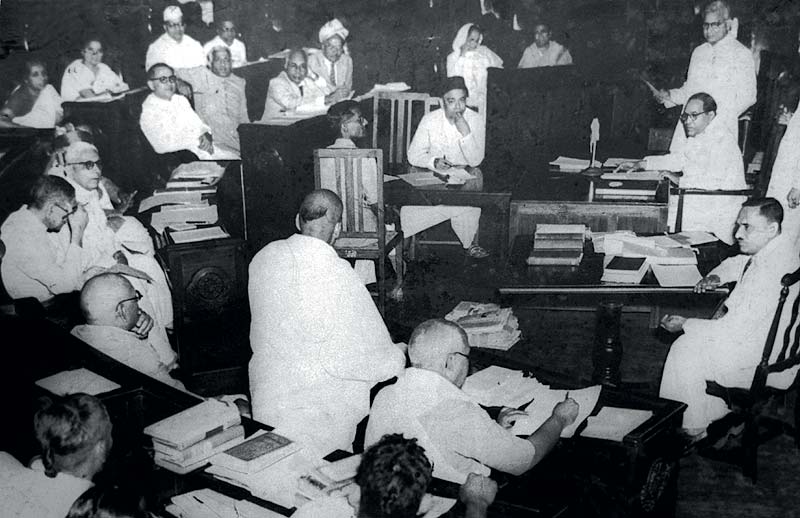The Ambedkarites were overjoyed by the outcome of the survey conducted in 21 states by OUTLOOK magazine in conjunction with CNN-IBN and History-18 channels to mark the 66th anniversary of Indian Independence. But there were many who could not digest the naming of Ambedkar as the greatest Indian and they voiced their disagreement publicly. Those who still harbour doubts about Ambedkar being the greatest Indian should better have a look at the cards issued by the School of International and Public Affairs of Columbia University in the US to mark 250 years of the varsity in the year 2004. The card listed the names of 40 persons of the world who had studied in the varsity and who had “given important contribution to bringing about effective changes in the world”. Ambedkar was at the top of the list. Here, it would be pertinent to mention that Columbia University has produced 95 Nobel laureates but it preferred to put Ambedkar above many of them. Be that as it may, the question is whether Ambedkar was a person who “changed the world” only among the alumni of Columbia or in the world as whole.

The ‘persons who changed the world’ were great men who worked for creating a society that would be free from exploitation and persecution; a society in which all men would be equal; a society which would have no place for economic inequalities. And these persons not only dreamt of such a society but they put everything they had at stake to build such a society. Among such great personalities were Buddha, Mazdak, Aristotle, Seneca, Hobbes, Locke, Rousseau, Voltaire, Thomas Paine, William Godwin, Proust, Charles Hall, Robert Owen, Marx, Lincoln, Mao and Ambedkar. A majority of the people place Marx in the top slot. They believe that Marx was the first to evolve a scientific solution to the problem of inequality. But those who consider Marx as the foremost philosopher of the world do not probe his limitations. The inequality which Marx sought to eliminate had its roots in science and technology. He had no understanding of the inequality and exploitation that is rooted in birth. The truth is that since the dawn of civilization, birth-related inequality was and continues to be prevalent in many countries of the world. That was why women and Blacks were treated worse than animals. And that was why the Indian Dalits were deprived of economic, political and religious power for thousands of years.
While in the capitalist system, a handful of capitalists exploit the masses, in casteism and apartheid, an entire section of the society exploits another section. In India, the exploiters constitute 15 per cent of the populace while the exploited are the remaining 85 per cent. In comparison, in America, 70 per cent Whites exploited the Blacks.
Marx could not come out with a formulation to combat birth-based exploitation and inequality. History cast this responsibility on the shoulders of Ambedkar and he discharged it with remarkable success.
The Marxist proletariats were weak only in the economic sense. They had no handicaps vis a vis politics and religion. On the other hand, the Dalits of India were not only poverty-stricken but they were deprived of their political, economic, religious and educational rights, courtesy religious diktats. Even their shadow was shunned. There was hardly any other community in the world which suffered such ignominy. How Dr. Ambedkar struggled against all odds and worked for the liberation of the Dalits can be written in golden letters in history.
What did Dr. Ambedkar do to change the world?
He ensured that the outcastes, who were deprived of all sources of power for centuries under the unwritten Hindu reservation system, got some share in socio-economic power by making provision for Reservation for them in the Constitution.
The outcome was overwhelming. Numerous Dalits began becoming MLAs, MPS, IAS and PCS officers, doctors and engineers and thus joining the national mainstream. This was something that was unimaginable for them. Like Dalits, other communities in the world, including women and the Blacks, who were also victims of birth-based discrimination, were forcibly kept away from sources of power. The success—even if partial—of the experiment of reservation for Dalits in India opened the doors of opportunities for the proletariat of other nations. The Ambedkarite formula for representation (Reservation) was used in the US, England, Australia, New Zealand, Malaysia and Ireland to give the communities reeling under birth-based deprivation, their due share in the sources of power. Reservation has revolutionized the socio-political space in South Africa. The Whites, who formed 9-10 per cent of the population but were controlling 80-90 per cent of the sources of power, are now gradually losing their monopoly while Mandela’s men are getting representation in proportion to their numbers.
Reservation has also helped women get their due place in the political arena all over the world. It is true that the Ambedkarite formulation of Reservation has changed the lives of the proletariats by-birth all over the world but much more needs to be done. Even today, the formulation of representation through reservation has not been fully implemented – not even in South Africa and the USA. Once that happens, we will not have to think twice before answering the question as to who changed the world most effectively.
Published in the January 2013 issue of the Forward Press magazine
Forward Press also publishes books on Bahujan issues. Forward Press Books sheds light on the widespread problems as well as the finer aspects of the Bahujan (Dalit, OBC, Adivasi, Nomadic, Pasmanda) community’s literature, culture, society and culture. Contact us for a list of FP Books’ titles and to order. Mobile: +919968527911, Email: info@forwardmagazine.in)





